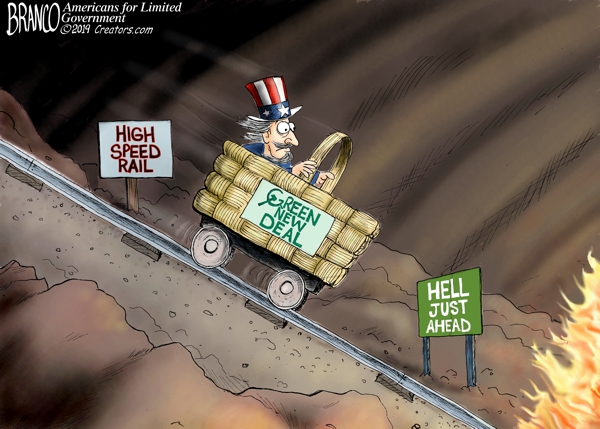The Green New Deal may already be coming off the tracks.
By far the dopiest part of the plan was the now-retracted summary offered by U.S. Rep. Alexandria Ocasio-Cortez that proposed “get[ting] rid of… airplanes” and replacing air travel with high speed trains, stating that a goal of the resolution is to “[b]uild out high-speed rail at a scale where air travel stops becoming necessary.”
On that breathtaking news, high-speed rail suddenly became a central focus of the plan, a lynchpin to the overall goal of reducing U.S.-based carbon emissions. Aviation fuel accounts for more than 10 percent of U.S. petroleum-based carbon emissions at more than 246 million metric tons a year and almost 5 percent of the total, according the Energy Information Agency.
Many Americans were horrified that the convenience of air travel might be eliminated by the plan, and so the statement was quickly retracted by Ocasio-Cortez, with Democrats and news outlets practically tripping over themselves to assure the American people they don’t really want to ban air travel to lay the tracks for high-speed rail.
Perhaps off of the bad press from that botched rollout, two prominent high-speed rail projects in California and Florida suffered major setbacks on Feb. 12.
First, it was announced by Gov. Gavin Newsom (D-Calif.) in his state of the state address that a planned $77 billion high-speed railway from Los Angeles to San Francisco had been cancelled, saying, “there simply isn’t a path to get from Sacramento to San Diego, let alone from San Francisco to L.A.”
“Let’s be real,” Newsom said, adding, “The current project, as planned, would cost too much and take too long.”
Then, a planned IPO by Virgin Trains USA (Brightline) for Feb. 13 that would run higher-speed rail from Orlando to Miami has been indefinitely postponed. Bloomberg News described Virgin Trains USA as a “money-losing Florida railroad running behind schedule on its own projections” in its reporting on the IPO’s cancellation.
The IPO had been panned a few days earlier by The Motley Fool’s Eric Volkman, who wrote, “Many people would love to see a viable alternative to the car and the airplane. The thing is, though, that passenger rail is a hard endeavor to make viable, hence its frequent subsidization by government bodies.”
Volkman added, “Ultimately, as a traveler and a person concerned about our dependence on the car, I want Virgin Trains USA to succeed and thrive. As an investment writer, I wouldn’t bet on that happening.”
Underscoring the lack of private interest in these projects, Virgin Trains USA has been depending on government funds, having already received approval for $1.75 billion of private activity bonds from the Department of Transportation and is pursuing another $3.7 billion Railroad Rehabilitation & Improvement Financing (RRIF) loan on top of that.
After the IPO’s cancellation, perhaps the question the Department of Transportation should be asking itself is if investors won’t be backing these projects for which there is not sufficient demand, then why should the government? Moreover, does the Trump administration really want to be underwriting high-speed rail projects that are a cornerstone for this Green New Deal?
No wonder Ocasio-Cortez calls for public funds to subsidize these rail projects and wants to make air travel “unnecessary” — which has become one of the dominant forms of long-distance travel — passenger trains simply cannot otherwise compete.
Probably because they’re obsolete. Just saying. What is this, 1850? Clearly, high-speed rail is fantasy project of the Soviet-style Green New Deal 10-year plan, a major boondoggle which you’d really have to ban planes to make viable. Not even California wants to buy into this. The U.S. has other significant infrastructure needs to address. Why are we wasting so much money on trains?
Robert Romano is the Vice President of Public Policy at Americans for Limited Government.







